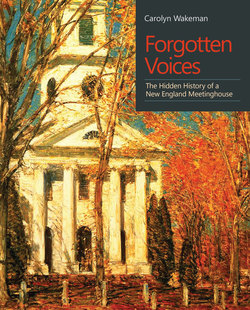Читать книгу Forgotten Voices - Carolyn Wakeman - Страница 12
На сайте Литреса книга снята с продажи.
ОглавлениеCHAPTER FIVE
On Elderly Childbearing
In a Sabbath sermon delivered to young scholars at the Collegiate School in Saybrook, Moses Noyes elaborated on the biblical story of Abraham to offer guidance about marriage and childbirth.
Hence we learn that men may have children when they are old. Oh! methinks some of my hearers are ready to enquire, can men have children when they are old? we fear they cannot. I answer men may have children when they are old; Abraham was an hundred years old.
Only one of Rev. Moses Noyes’s sermons survives. Preached at the Collegiate School in Saybrook on a “holy day of Christian Sabbath” in 1707, it preserves the voice of Lyme’s minister speaking from the lectern. Noyes had by then served for four years as a trustee of the school, which despite his objection moved a decade later to New Haven and became Yale College.
Connecticut’s General Assembly had chartered the Collegiate School in 1701 to instruct the colony’s youth in the arts and sciences and fit them “for public employment both in church and civil state.” The group of founding ministers, which included Rev. James Noyes, requested prior advice from several Boston colleagues. Rev. Cotton Mather responded with a detailed “Scheme for the College,” and Judge Samuel Sewall promised a later “essay.” He sent instead “a sheet to discourage our trading to Africa for men,” a three-page pamphlet published in Boston the previous year. Viewed today as America’s first antislavery tract, The Selling of Joseph: A Memorial expressed Sewall’s opposition to the African slave trade and the practice of slavery in the American colonies. Whether the “sheet” influenced the thoughts of Connecticut ministers preparing to educate the colony’s future leaders is not known.
After Connecticut’s General Court passed “An Act for the Liberty to Erect a Collegiate School” in 1701, Nathaniel Lynde deeded a building and two acres in Saybrook “for the liberal education of youth that by God’s blessing may be fit for public service.”
When Rev. Moses Noyes preached to students at the college six years after its founding, his topic was childbearing. Offering a literal interpretation of a passage in Genesis describing Abraham as a hundred years old when his son Isaac was born, he advised the young scholars in Saybrook that both men and women could conceive children at an advanced age. Addressing them as “my brethren, my dear brethren,” he also explained that while men could “beget” sons, they could not themselves bear children, for “they have not the proper organs for the business.” He then recommended that the future ministers and government officials “marry wives younger than themselves” since men could conceive over a longer span of years than women.
Newly elected as a trustee of the Collegiate School in 1703, Moses Noyes signed the diploma of John Hart, age twenty-one, who graduated alone that year at Saybrook.
Demographic data are scarce for early Connecticut towns, where marriage age varied widely, but Moses Noyes’s guidance reflected his own experience. Like his brother James, he had married at about age thirty-four and had chosen a wife ten years younger. Both Matthew Griswold and Richard Ely, a generation older than Lyme’s minister, married at around age thirty-six and also chose younger wives, but some of Noyes’s contemporaries married earlier. Joseph Peck (1640–1718), two years older than Moses Noyes and a church deacon, was about twenty-one when he married Sarah Parker (1636–1726), some five years his senior.
With an apology that he may have “tired the patience” of the Collegiate School students, Noyes, then sixty-three and a grandfather, concluded his sermon with words of reassurance. “Men and women too may have no reason of discouragement,” he advised, “for they may have children when they are exceeding old.” He ended his lecture with a warning about “the necessity of having midwives” and an additional reminder about the importance of good midwives. Deaths in childbirth were common, and while his own four children had lived to adulthood, the seventh and last child of his brother James, named Moses, died in 1692 at age five weeks.
When Noyes delivered his remarks on childbearing in 1707, the eldest son of his sister Sarah Hale served as senior tutor at the Collegiate School and wrote down “in short hand” the words of his uncle’s sermon. James Hale (1685–1742) had graduated from Harvard in 1703, a year after the publication of his father’s treatise on witchcraft, and served for two years as a tutor in Saybrook. He settled in 1718 as the founding minister in Ashford, Connecticut, and several of his family members later moved to Vermont, where Rev. Moses Noyes’s curious sermon on childbearing appeared in print in 1785.
